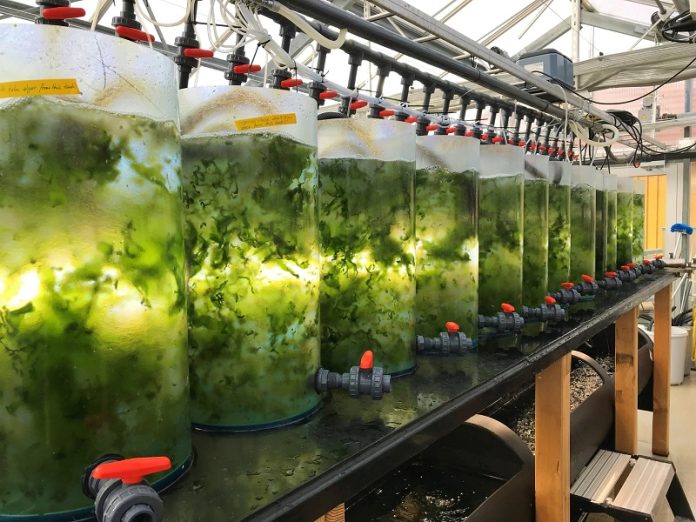
Seaweed, particularly a type called sea lettuce, could soon become a key source of protein in our diets.
Researchers from Chalmers University of Technology in Sweden have developed a method to extract protein from sea lettuce up to three times more efficiently than before, potentially paving the way for seaweed-based foods like protein smoothies and seaweed burgers.
This breakthrough, published in the journal Food Chemistry, could transform the way we think about sustainable food.
Sea lettuce, or Ulva fenestrata, is a type of green seaweed that grows on rocks in calm waters or floats freely on the ocean’s surface, resembling ordinary lettuce.
Unlike land crops, sea lettuce doesn’t need watering, fertilizer, or pesticides, making it an eco-friendly food source. It’s also packed with essential nutrients, including protein, vitamin B12, and omega-3 fatty acids, the same healthy fats found in oily fish like salmon.
Seaweed fits well within the “protein shift” movement—a global effort to move away from red meat toward more sustainable protein sources, such as pea, soy, and mushroom proteins, to lower the climate impact of food production.
Despite the popularity of plant-based proteins, ocean-based proteins, often called “blue proteins,” remain largely untapped. Seaweed, with its impressive nutritional content and low environmental footprint, could fill that gap.
The Chalmers team, part of the CirkAlg project, which aims to create a “blue-green” food industry in Sweden, has found a way to make seaweed proteins more accessible.
Traditionally, extracting protein from seaweed has been challenging because seaweed proteins are tightly bound and difficult to separate.
This new method overcomes that barrier by breaking down the cell membranes of sea lettuce to reach both water-soluble and fat-soluble proteins. By adjusting the pH levels of the water, the proteins can be separated into a concentrated powder, making it easier to use in food.
João Trigo, a researcher at Chalmers, describes the resulting dark green powder as having a “umami” flavor with a hint of salt, making it a great addition to seafood dishes or even as a flavor booster for other foods.
He imagines the possibilities of “blue burgers” or protein smoothies from seaweed, bringing a new taste and nutritional profile to the table.
In addition to protein, sea lettuce offers other valuable nutrients, including vitamin B12, which is often lacking in vegetarian diets, and omega-3 fatty acids.
This makes it an excellent option for people who avoid animal products but still want to maintain a balanced diet. Sea lettuce also adapts well to different water conditions, growing easily in various salinity levels and absorbing nitrogen, making it a resilient crop.
Professor Ingrid Undeland from Chalmers, a coordinator of the CirkAlg project, emphasizes the need for diverse protein sources to meet the world’s nutritional and sustainability needs. “Algae is a good addition to the products already on the market,” she says, noting that sea-based proteins have been overlooked as a food source.
The team is also exploring ways to increase the protein content in seaweed by growing it in water that contains nutrients from the seafood industry. This approach not only boosts the protein levels in seaweed but also recycles valuable nutrients back into the food system, making it an efficient and sustainable choice.
At Tjärnö Marine Laboratory in Sweden, researchers have conducted successful cultivation experiments, growing sea lettuce in nutrient-rich water. These trials aim to make the most of every part of the seaweed, not just for food but potentially for other uses like materials and even medicine, with the ultimate goal of achieving zero waste.
The new extraction process could help make seaweed protein as affordable and accessible as pea and soy proteins, opening the door to a variety of seaweed-based foods.
With continued research, seaweed may soon become a staple protein source, offering a sustainable, nutrient-rich option for consumers and helping to meet global food demands in an environmentally friendly way.
If you care about nutrition, please read studies about how Mediterranean diet could protect your brain health, and the best time to take vitamins to prevent heart disease.
For more information about health, please see recent studies about plant nutrients that could help reduce high blood pressure, and these antioxidants could help reduce dementia risk.



